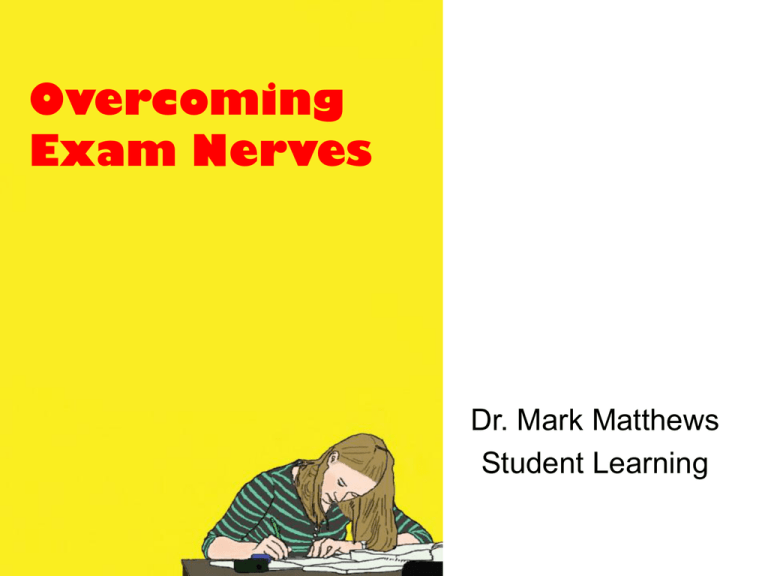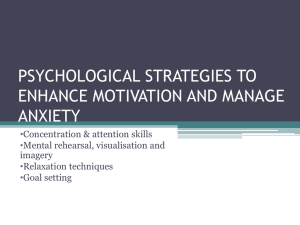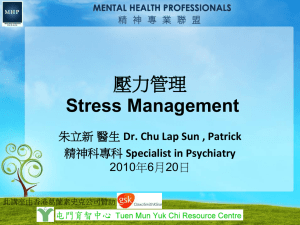Exam Nerves 2011- (MS PowerPoint 10.5 MB)
advertisement

Overcoming Exam Nerves Dr. Mark Matthews Student Learning Knowledge Attitude Exam Performance Managing Nerves 1. 2. 3. 4. Why do we get nervous? Managing Anxiety Lifestyle Changes On the Day Fight or Flight • Foundation of Stress • Self-protection mechanism • Automatic reaction to perceived threat • Prepares for massive physical exertion Your Body Changes • Acceleration of heart and lung • Paling or flushing • Inhibition of stomach • Constriction of blood vessels • Dilation of pupils • Auditory exclusion • Tunnel vision • Shaking And the body becomes flooded with adrenaline At very high levels of Adrenaline Your brain shuts down which is inconvenient if you are sitting an exam How can we manage anxiety? Practice Practice Exam Skills 50% how well you know your material 50% personal reactions to exams Practice Everything… Timings Answer Technique Same Clothes Same Pens ….. Your goal should be to have as little new information as possible on exam day “I've noticed that worrying is like praying for what you don't want to happen.” Practice Dealing with Negative Emotions • Sometimes we avoid thinking about exams • Avoid dealing with anxieties • Leaves space for negative thoughts Replace Them With Positives Thoughts and Feelings Visualisation Visualisation Loss of focus Relaxation Exam Centres Find out where your exam is. Visit the exam venue Tie down the details Avoid Caffeine Alcohol Salt & Sugar More Water Carbohydrates Vegetables firewall Mindfulness Meditation Breathing Space (5 mins) The 5 minute Breathing Space is a terrific tool to have available to you at any time when you feel you need a moment to tune in to what’s going on for you. https://podcast.tcd.ie/users/scs/ Take Action Take steps to overcome problems: • Relaxation • Visualisation • Get Help • Regular Exercise • Positive Thoughts How do you prepare? • What will you do to prepare for the exams? • What do you do the night before? • What do you do on the day of your exam? 5 Minutes On the Day Things to do • • • • • Eat breakfast Try to stay calm Give yourself enough time Avoid anything that increases anxiety Arrive Early, Avoid People! Relaxation • Keep calm: If you start to feel nervous, breathe deeply. • Use Relaxation exercises • Don't panic: Say to yourself in your head 'I CAN do this exam' In the hall • Focus on doing well (positive) • Fill out your answer books • If you panic, use relaxation techniques • Be prepared – warm clothes, water • Know where everything is Planning your answer • • • • Deconstruct the question first Do quick outline Rough notes under headings Then begin to write your answer Practice Exam Skills • How well you manage your personal reactions to exams is at least as important as how well you know your material. • This involves deliberate action in dealing with negatives, replacing them with positives and practicing until the positives become automatic. • Knowing something is not the same as being able to do it when the situation demands it. You need to practice in a simulated environment. Student Learning Development Thank you for your time Visit our website at: http://student-learning.tcd.ie

